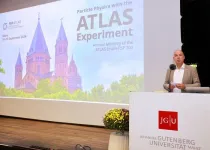(Press-News.org) The connections between particles and their mass, the composition of the universe out of matter and antimatter and the search for previously unknown particles such as the so-called “dark matter” are the focus of researchers at the research center CERN in Geneva, which is celebrating its 70th birthday this year with events all around the world. In four large-scale experiments, scientists at the Large Hadron Collider (LHC) are getting to the bottom of the secrets of the universe. This particle accelerator offers researchers the unique opportunity to recreate the energetic conditions shortly after the Big Bang and thus investigate fundamental questions of elementary particle physics and cosmology: Two high-energy proton beams of 3.5 tera-electronvolts each have been colliding at the LHC since March 2010, resulting in a center-of-mass energy of 7 tera-electronvolts. This was increased to 13.6 tera-electronvolts in 2022 after a multi-year upgrade phase. The interactions that take place in these collisions are measured using two multipurpose detectors. The larger of these is called ATLAS, weighs 7,000 tons and is an impressive 46 meters long and 25 meters in diameter. It was used to discover the Higgs boson in 2012, the properties of which have since been researched in more detail by several working groups. The international ATLAS collaboration has a total of around 6,000 members from 41 countries.
Mainz contribution to the ATLAS experiment
In Germany, 17 universities and research institutions are involved in the ATLAS experiment, including Johannes Gutenberg University Mainz (JGU), represented by the Experimental Particle and Astroparticle Physics (ETAP) group at the Institute of Physics (working groups of Professor Volker Büscher, Professor Lucia Masetti, and Professor Stefan Tapprogge), which is an important part of the Cluster of Excellence PRISMA+. JGU is responsible for instance for the construction and operation of high-speed electronics for the so-called trigger of the ATLAS detector, which is used to decide fully automatically 40 million times per second which data from the detector will be stored for later analysis. The research is funded by the German Federal Ministry of Education and Research (BMBF) via a collaborative research center (Forschungsschwerpunkt, FSP) within the framework program “Exploration of the Universe and Matter” (ErUM).
Annual meeting back at JGU after 14 years
The German research groups involved in the ATLAS experiment work closely together on the operation, data analysis and upgrade of the detector and make key contributions to the development, construction and upgrade of all ATLAS detector systems. These include, for example, the pixel detector, the liquid argon calorimeters and the muon detectors, as well as various trigger systems that can be used to select specific particle collisions at the LHC. Once a year, the members of the ATLAS-FSP meet to discuss results of the ATLAS experiment, analyze the recorded data and coordinate future work. This year, the meeting will take place on the JGU campus for the first time since 2010 and will mainly focus on data analysis from the third run of the LHC (“Run 3”) and the upgrade of the ATLAS detector planned for 2030: The LHC will be upgraded to the so-called “High-Luminosity LHC” (HL-LHC), which will allow the beam intensity to be increased almost tenfold, but will also pose new challenges for the ATLAS detector. “Johannes Gutenberg University Mainz is grateful to host this workshop to promote scientific exchange between the German ATLAS groups,” emphasized JGU President Professor Georg Krausch. “As president, I am pleased that JGU will continue to make a strong contribution to the High-Lumi LHC in the future and, in doing so, promote our university’s international visibility.” “With the new data from Run 3 and the HL-LHC in particular, we have the unique opportunity to precisely study the newly discovered and still very mysterious Higgs particle and thus make completely new discoveries about the physics of our universe,” explains Professor Volker Büscher. The annual meeting of the ATLAS-FSP ends tomorrow, Friday, September 13.
END
JGU hosts annual meeting of the ATLAS Collaborative Research Center
Around 120 physicists are coming together on the campus of Johannes Gutenberg University Mainz from September 10 to 13 to analyze data from the ATLAS experiment at the LHC/CERN
2024-09-12
ELSE PRESS RELEASES FROM THIS DATE:
Med school scientist receives prestigious NSF award for inflammation research
2024-09-12
Associate Professor Justine Tigno-Aranjuez will use a five-year grant of more than $1 million to study how influences on the production of lipid mediators to better understand impacts on inflammation.
A College of Medicine researcher has received a prestigious U.S. National Science Foundation CAREER Award to support her research into the cellular causes of inflammation, discoveries that could be pivotal for treating conditions like Crohn’s disease and arthritis.
Justine Tigno-Aranjuez’s lab has been researching lipid mediators — ...
Uptick in drug overdose rates is widely reported especially among young women
2024-09-12
Overdose rates in Colombia involving illegal opioids, hallucinogens, stimulants and sedative psychotropic medication increased greatly during 2018-2021, mainly caused by overdoses in young women, according to a study at Columbia University Mailman School of Public Health. Drug overdoses increased by 356 percent from 8.5 to 40.5 percent per 100,000 individuals from 2010 to 2021. The findings are published in the American Journal of Public Health.
The study is the first to describe national ...
Understanding what helps families with teens maintain household vaping bans
2024-09-12
UNIVERSITY PARK, Pa. — In the roughly 20 years since e-cigarettes were introduced in the United States, use among young people has grown substantially. By 2022, more than one in five high school seniors reported they had vaped nicotine in the past month.
Household smoking bans — rules against anybody smoking inside a home — are an effective tool for delaying or preventing teen cigarette smoking, according to Jennifer Maggs, professor of human development and family studies at Penn State, and her collaborators, so they examined if the same might hold true for vaping. They assessed how many households with teenage children in the ...
Can AI talk us out of conspiracy theories?
2024-09-12
Have you ever tried to convince a conspiracy theorist that the moon landing wasn’t staged? You likely didn’t succeed, but ChatGPT might have better luck, according to research by MIT Sloan School of Management professor David Rand and American University professor of psychology Thomas Costello, who conducted the research during his postdoctoral position at MIT Sloan.
In a new paper “Durably reducing conspiracy beliefs through dialogues with AI” published in Science, the researchers show that large language models can effectively reduce ...
‘Even the deepest of rabbit holes may have an exit’
2024-09-12
Embargoed: Not for Release Until 2:00 pm U.S. Eastern Time Thursday, 12 September 2024
‘Even the deepest of rabbit holes may have an exit’
Pathbreaking psychology study reveals conversations with AI models can reduce conspiracy theory beliefs
(WASHINGTON, D.C.) Sept. 12, 2024 – ‘They’re so far down the rabbit hole of conspiracy theories that they’re lost for good’ is common thinking when it comes to conspiracy theorists. This generally accepted notion is now crumbling.
In a pathbreaking research study, a team of researchers from American University, ...
An exit for even the deepest rabbit holes: Personalized conversations with chatbot reduce belief in conspiracy theories
2024-09-12
Personalized conversations with a trained artificial intelligence (AI) chatbot can reduce belief in conspiracy theories – even in the most obdurate individuals – according to a new study. The findings, which challenge the idea that such beliefs are impervious to change, point to a new tool for combating misinformation. “It has become almost a truism that people ‘down the rabbit hole’ of conspiracy belief are almost impossible to reach,” write the authors. “In contrast to this pessimistic view, we [show] that a relatively brief conversation with a generative AI model can produce ...
How is open access transforming science communication?
2024-09-12
In a Policy Forum, Mark McCabe and Frank Mueller-Langer explore how new open access (OA) mandates and agreements are changing how scientists share their work. They outline key contemporary unknowns in the open access landscape, as well as avenues for continued research. Since 2003, many national governments and international organizations have supported the Berlin Declaration on Open Access (OA) to Knowledge. More recently, some governments and organizations have introduced mandates to ensure open access ...
US food waste bans fail to reduce landfill waste, except in Massachusetts
2024-09-12
State-level bans on commercial organic waste disposal have largely failed to reduce landfilled waste across the U.S., with one state standing out as the lone success, according to a new study. Massachusetts alone achieved a significant reduction in landfilled waste when it implemented food waste bans. The findings underscore the importance of well-designed and enforced policies, with Massachusetts offering a potential model for effective waste management. “Our study shows that food waste bans are far from guaranteed to be successful,” ...
Greenland landslide-induced tsunami produced global seismic signal that lasted 9 days
2024-09-12
In 2023, a massive rockslide in East Greenland, driven by glacial melt, triggered a towering tsunami and a rare global seismic signal that resonated for nine days, according to a new study. The study provides insights into how climate change-induced events like glacial thinning can lead to significant geophysical phenomena with impacts extending throughout the Earth system. Due to climate change, steep slopes are increasingly vulnerable to landslides. In Arctic regions – which are undergoing the most rapid warming globally ...
Climate change-triggered landslide unleashes a 650-foot mega-tsunami
2024-09-12
In September 2023, scientists around the world detected a mysterious seismic signal that lasted for nine straight days. An international team of scientists, including seismologists Alice Gabriel and Carl Ebeling of UC San Diego’s Scripps Institution of Oceanography came together to solve the mystery.
A new study published today in Science provides the stunning solution: In an East Greenland fjord, a mountaintop collapsed into the sea and triggered a mega-tsunami about 200 meters (650 feet) tall. The giant ...
LAST 30 PRESS RELEASES:
UCSB scientists bottle the sun with liquid battery
Lung cancer drug offers a surprising new treatment against ovarian cancer
When consent meets reality: How young men navigate intimacy
Siemens Healthineers and Mayo Clinic expand strategic collaboration to enhance patient care through advanced technology
Physicists develop new protocol for building photonic graph states
OHSU-led research initiative examines supervised psilocybin
New review identifies pathways for managing PFAS waste in semiconductor manufacturing
New research finds state-level abortion restrictions associated with increased maternal deaths
New study assesses potential dust control options for Great Salt Lake
Science policy education should start on campus
Look again! Those wrinkly rocks may actually be a fossilized microbial community
Exposure to intense wildfire smoke during pregnancy may be linked to increased likelihood of autism
Children with Crohn’s have distinct gut bacteria from kids with other digestive disorders
Genomics offers a faster path to restoring the American chestnut
Caught in the act: Astronomers watch a vanishing star turn into a black hole
Why elephant trunk whiskers are so good at sensing touch
A disappearing star quietly formed a black hole in the Andromeda Galaxy
Yangtze River fishing ban halts 70 years of freshwater biodiversity decline
Genomic-informed breeding approaches could accelerate American chestnut restoration
How plants control fleshy and woody tissue growth
Scientists capture the clearest view yet of a star collapsing into a black hole
New insights into a hidden process that protects cells from harmful mutations
Yangtze River fishing ban halts seven decades of biodiversity decline
Researchers visualize the dynamics of myelin swellings
Cheops discovers late bloomer from another era
Climate policy support is linked to emotions - study
New method could reveal hidden supermassive black hole binaries
Novel AI model accurately detects placenta accreta in pregnancy before delivery, new research shows
Global Physics Photowalk winners announced
Exercise trains a mouse's brain to build endurance
[Press-News.org] JGU hosts annual meeting of the ATLAS Collaborative Research CenterAround 120 physicists are coming together on the campus of Johannes Gutenberg University Mainz from September 10 to 13 to analyze data from the ATLAS experiment at the LHC/CERN

